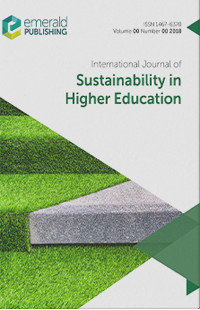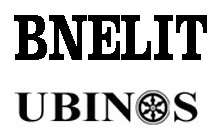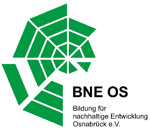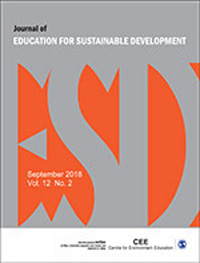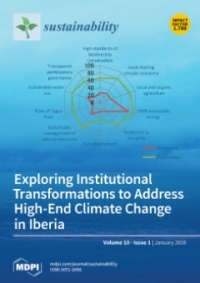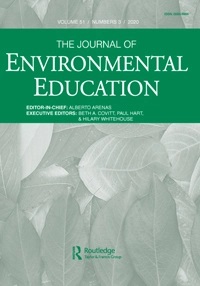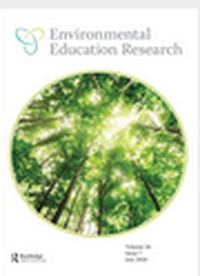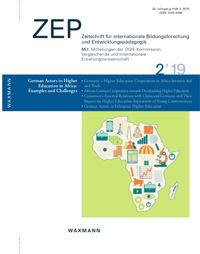Wiss. Fachzeitschriften zu BNE, ESD,...
Entsprechend dem thematischen Profil von BNELIT geht es hier um Bildung für nachhaltige Entwicklung (BNE), Umweltbildung, Globales Lernen,...,Education for Sustainable Development (ESD), Environmental Education, Global Learning,... und damit zusammenhängende Themen in einer Auswahl der wichtigsten und am häufigsten für BNELIT verwendeten wissenschaftlichen Fachzeitschriften
Die ersten deutschsprachigen Zeitschriften zum damals neuen Thema Umweltbildung, für das zahlreiche Begriffe verwendet wurden, gab es ab 1978. Es waren insgesamt 8 Zeitschriften ..., in denen das Konzept BNE zunehmend eine Rolle spielte... Sie existierten meistens nur wenige Jahre und leider nur bis 2011 (Ehemalige Zeitschriften zur Umweltbildung/BNE)
Im wissenschaftlichen Bereich entstanden in den letzten Jahren zahlreiche englischsprachige Zeitschriften zu diesem Themenbereich. Sie erlangen zunehmende Bedeutung und werden auch von etlichen deutschen WissenschaftlerInnen genutzt. Die Nutzung dieser Zeitschriften wird deshalb ab 2025 stark reduziert. Eine Ausnahme spielt lediglich die Zeitschrift für internationale Bildungsforschung und Entwicklungspädagogik (ZEP) mit überwiegend deutschsprachigen Artikeln, deren Gesamtbestand in unserer Bibliothek steht - Auch in Zukunft (s. unten)
Von diesen wiss. Zeitschriften ziemlich getrennt sind die (schul)praxisbezogenen deutschsprachigen (fach)didaktischen Zeitschriften, in denen Bildung für nachhaltige Entwicklung leider immer noch eine ziemlich geringe Rolle spielt... (Auswahl)
International Journal of Sustainability in Higher Education
International Journal of Sustainability in Higher Education (IJSHE) is the first international scholarly publication to specifically address the need for documentation and the dissemination of research, studies and projects on sustainability matters at higher education institutions.
The issue of sustainability in a higher education context is, to some extent, a recent theme. Since over 600 universities worldwide have committed themselves towards sustainability by signing international agreements and convention such as the Bologna Charter, The Halifax Declaration, the Talloires Declaration and the Copernicus Charter for Sustainable Development, the journal provides a vital outlet for this emerging research field...
Journal of Education for Sustainable Development
The Journal of Education for Sustainable Development (JESD) is a forum for academics and practitioners to share and critique innovations in thinking and practice in the emerging field of Education for Sustainable Development (ESD). A peer-reviewed international journal, JESD aims at global readership and is published twice a year.
The journal seeks articles from the field of environmental education, which pioneered much of the work in ESD, as well as from economics, communications, education, social sciences and the humanities.
The journal is formatted in sections of news, opinion, project descriptions, research, academic opportunities and reviews. Research articles develop, test, or advance ESD theory, research or practice. Project descriptions focus on innovative ESD projects and programmes. A special section addresses international news and events related to the Education for Sustainable Development. The journal publishes reviews of books, videos/films, curricula, and other print and nonprint ESD materials and programmes. Notes and comments from readers continue the discussion. This journal is a member of the Committee on Publication Ethics (COPE).
Journal of Sustainability Education
The Journal of Sustainability Education (JSE) serves as a forum for academics and practitioners to share, critique, and promote research, practices, and initiatives that foster the integration of economic, ecological, and social-cultural dimensions of sustainability within formal and non-formal educational contexts
Sustainability.
Sektion Sustainable Education and Approaches (Special Issues)
Sustainability (ISSN 2071-1050) is an international and cross-disciplinary scholarly, open access journal of environmental, cultural, economic and social sustainability of human beings, which provides an advanced forum for studies related to sustainability and sustainable development. It publishes reviews, regular research papers, communications and short notes, and there is no restriction on the length of the papers. Our aim is to encourage scientists to publish their experimental and theoretical research relating to natural sciences, social sciences and humanities in as much detail as possible in order to promote scientific predictions and impact assessments of global change and development. Full experimental and methodical details must be provided so that the results can be reproduced.
The Journal of Environmental Education
Any educator in the environmental field will find The Journal of Environmental Education indispensable. Based on recent research in the sciences, social sciences, and humanities, the journal details how best to present environmental issues and how to evaluate programs already in place for primary through university level and adult students. University researchers, park and recreation administrators, and teachers from the United States and abroad provide new analyses of the instruction, theory, methods, and practices of environmental communication and education in peer-reviewed articles. Reviews of the most recent books, textbooks, videos, and other educational materials by experts in the field appear regularly. Not only for teachers, JEE is for those who administer and fund environmental education programs for schools, parks, camps, recreation centers, and businesses.
Environmental Education Research
The mission of Environmental Education Research is to advance research-based and scholarly understandings of environmental and sustainability education. The journal achieves this by publishing peer reviewed research and scholarship on all aspects of environmental education, sourced from around the world and diverse schools of thought and practice in inquiry.
The editorial board welcomes submission of original, high quality and innovative papers derived from empirical, philosophical, practice-or policy-related investigations of environmental and sustainability education. The journal’s primary audiences are those working in or with the broad fields of education and educational research, and environmental studies, and relevant interdisciplinary or subdisciplinary aspects.
Zeitschrift für internationale Bildungsforschung und Entwicklungspädagogik (ZEP)
Zukünftige Dimensionen entwicklungs- pädagogischer Arbeit sind heute weitgehend unbekannt. Unsere globalen Lebensräume und Alltagswelten entwickeln sich in immer komplexeren Zusammenhängen. Alte Gewissheiten lösen sich auf, neue Orientierungen sind nur selten zu erkennen. So wird es immer schwerer auf die neuen Herausforderungen entwicklungspädagogisch sinnvolle Antworten zu finden, die es ermöglichen, das Wissen und die Verhaltensweisen für eine zukunftsorientierte Lebensweise zu vermitteln.
Mit der Zeitschrift ZEP (Zeitschrift für internationale Bildungsforschung und Entwicklungspädagogik), die anfangs Zeitschrift für Entwicklungspädagogik ... hieß, haben die Herausgeber/-innen und Redaktionsmitglieder seit 1978 ein Medium geschaffen, Entwicklungspädagogik und internationale Bildungsforschung öffentlich werden zu lassen.
In den Themenheften werden unter klaren Fragestellungen komplexe theoretische Zusammenhänge aufgegriffen und erläutert. Ebenso werden Erfahrungen und Problemstellungen aus der Praxis so angesprochen, dass sie wichtige Anstöße für die wissenschaftliche Diskussion rückvermitteln. Bis Ausgabe 2/2020 sind in BNELT 754 Aufsätze und alle ca. 160 Ausgaben aufgenommen:
Z. für intern. Bildungsforschung und Entwicklungspädagogik (ab 1994)
ZEP - Zeitschrift für internationale Bildungsforschung und Entwicklungspädagogik
Z. für Entwicklungspädagogik ... (bis 1993)
